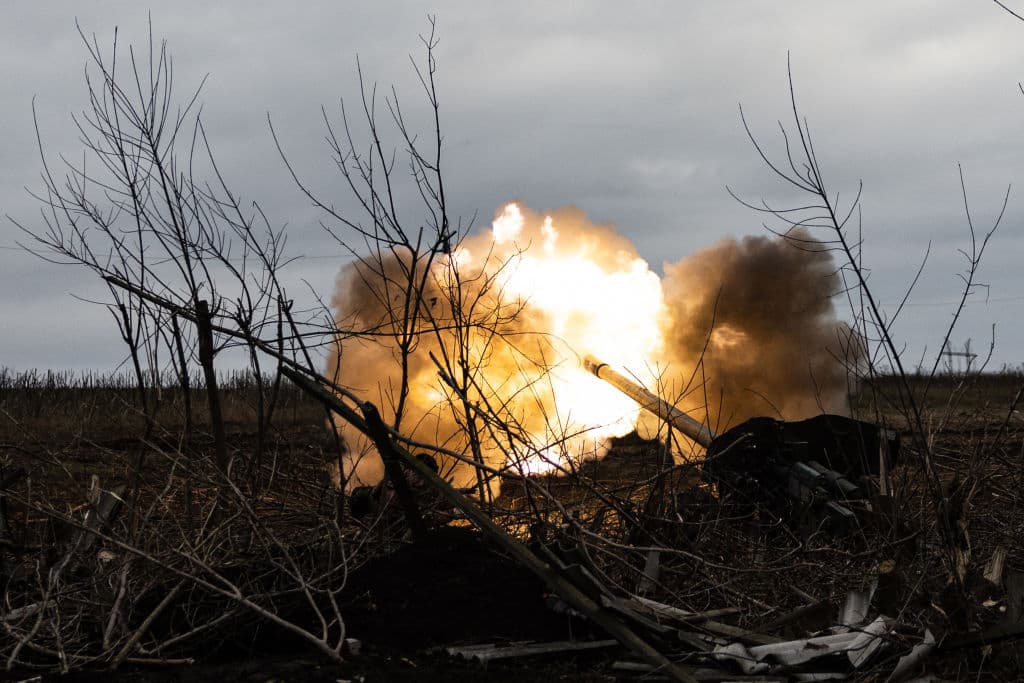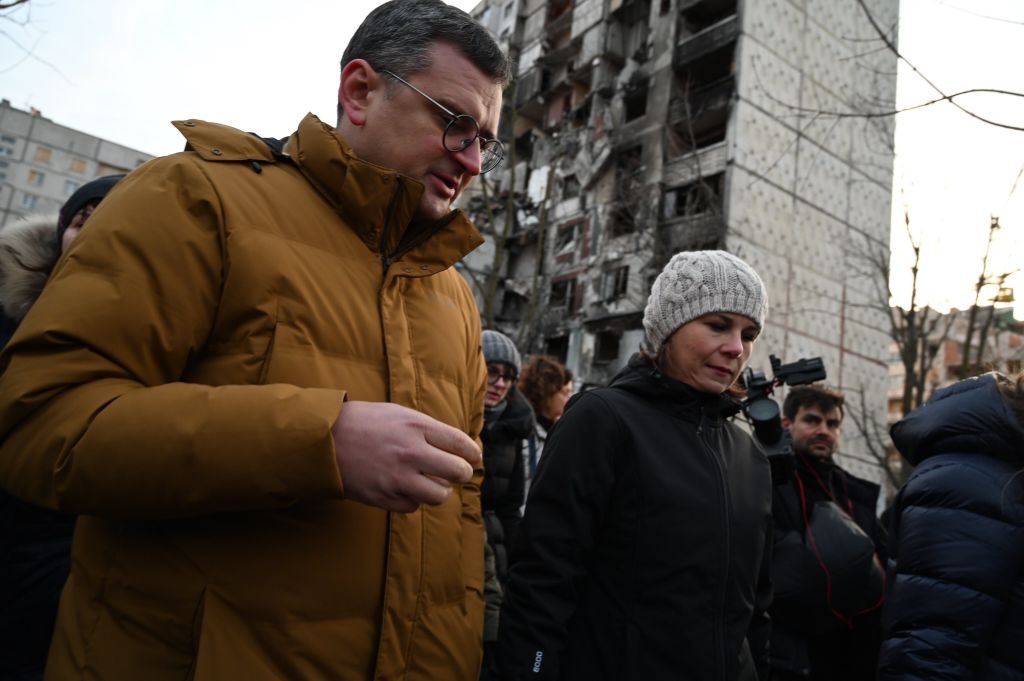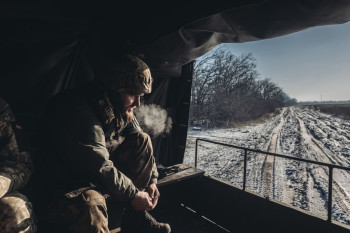Ukraine war latest: Russian militants say Soledar captured, Ukraine doesn't confirm

Key developments on Jan. 10:
- Russia digs in on Soledar, Donetsk Oblast
- German Foreign Minister visits Kharkiv's worst-hit residential district
- Kuleba confident Germany will supply Ukraine with Leopard tanks
- Canada vows to buy NASAMS air defense system for Ukraine
Russian militants in eastern Ukraine said late on Jan. 10 that Russia had captured Soledar, claiming a rare victory after facing a series of humiliating defeats across the front line.
Ukraine's military has not confirmed losing the small salt-mining town 10 kilometers north of Bakhmut, Donetsk Oblast.
Yevgeny Prigozhin, the founder of the Kremlin-led Wagner Group mercenaries and a close ally of Russian President Vladimir Putin, claimed earlier that fighting was raging in the western part of Soledar.
Ukrainian forces were "gradually" withdrawing from Soledar and losing control of their last holdouts in the town, Prigozhin said at around 5 p.m. A few hours earlier, he said that heavy fighting was taking place in the central part of the town.
Earlier in the day, the U.K. Defense Ministry said that Russian troops, together with the Kremlin-controlled Wagner Group mercenaries, likely occupied most of Soledar over the past four days.
Russian forces continue to storm Soledar in the eastern Donetsk Oblast, and "heavy fighting" is raging, Deputy Defense Minister Hanna Maliar said.
Serhii Cherevatyi, a spokesman for Ukraine's Eastern Military Command, said on Jan. 10 that Russian forces had struck Soledar and its surrounding area 86 times using various artillery systems over the past day.
Cherevatyi also said that the goal of the Ukrainian military defending Soledar is to exhaust Russians "so that even if they get a tactical win, it becomes a Pyrrhic victory."
Neither Kyiv nor Moscow has commented on Russian proxies' claimed victory in Soledar, which sits north of Bakhmut – a city Russia has attempted to capture for more than five months.
However, encircling Bakhmut remains a distant goal for Russia even after it captures Soledar, according to military analysts.
To cut Ukraine's supply line to Bakhmut and potentially encircle the city, Russia would need to establish control over at least two highways west of Soledar, the Institute for the Study of War, a Washington-based think-tank observing the war in Ukraine, said on Jan. 7.
Russia has stepped up its bid to capture Soledar, ultimately aiming to seize Bakhmut, which would allow Russia to press toward key cities in Donetsk Oblast – including Kramatorsk and Sloviansk, located 40 kilometers west.
'Gathering forces for another escalation'
President Zelensky said in his evening address that "Russia is gathering forces for another escalation" and that Ukraine was working with its partners to prevent this from happening.
Zelensky did not go into further details about the escalation.
The president's warning comes a few weeks after Ukraine's senior officials said Russia could launch another major offensive from multiple fronts in early 2023.
Zelensky, Defense Minister Oleksii Reznikov, and Intelligence Directorate Chief Kyrylo Budanov all have said that they anticipate Russia to begin a second wave of mobilization amid its stalled war efforts.
Several Western countries have vowed to send more weapons to Ukraine as the full-scale invasion approaches the 11-month mark.
On Jan. 10, Canadian Prime Minister Justin Trudeau's Office announced that Ottawa would buy a NASAMS air defense system for Ukraine.
"NASAMS procured for us by Canada will be a strong shield for our cities and citizens," Zelensky said in a Twitter post.
Baerbock visits Kharkiv, Ukraine asks for tanks
German Foreign Minister Annalena Baerbock made a surprise visit to the once heavily-bombarded eastern city of Kharkiv on Jan. 10. Standing there with her Ukrainian counterpart Dmytro Kuleba, she took the opportunity to condemn Russia's attacks on civilian infrastructure and to assure Ukrainians of the support of Germany and the European Union.
"In all parts of Ukraine, from Kharkiv to Kherson to Kyiv, people should know that they can count on our solidarity and support," said in a statement.
Baerbock's visit comes as Berlin faces renewed pressure from its allies to supply Kyiv's long-sought Leopard 2 battle tanks to Ukraine. The pressure renewed when French President Emmanuel Macron promised his Ukrainian counterpart Volodymyr Zelensky on Jan. 4 to hand over light tanks, becoming the first Western European country to do it.
Speaking at an event for his center-left Social Democratic Party (SPD) on Jan. 9, German Chancellor Olaf Scholz said that Western allies had spent "a long time" planning weapon deliveries for Ukraine and "Germany will not go alone."
Berlin has hesitated to step up its heavy weapon deliveries for Ukraine over fears that such a move could escalate the conflict and allow Russia to deem it a party to the war.
But there is a shift in Berlin's Ukraine policy following the German foreign minister's first visit to Kharkiv, according to Kuleba, who said he accompanied Baerbock to a school and an energy infrastructure destroyed due to Russia's attacks.

In a Facebook post, Kuleba said he held three-hour-long talks with Baerbock to discuss the Kyiv-designed peace formula, sanctions against Russia, tribunal, European integration, and weapons.
"I have no doubts that Ukraine will receive German Leopard tanks," Kuleba said.
However, Kuleba added that Berlin hadn't made a final decision yet, and Ukraine is "losing precious time and lives" due to the delay.
While thanking Baerbock for visiting Ukraine, Kuleba reiterated that "the last major decision remained – on the provision of German tanks."
Baerbock or other Berlin officials have not publicly confirmed yet that Germany is due to supply Kyiv's long-sought tanks.
Last week, Germany and the U.S. agreed to provide Ukraine with infantry fighting vehicles – NATO-standard armor that the West had been reluctant to transfer.










